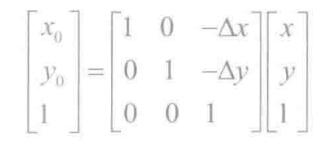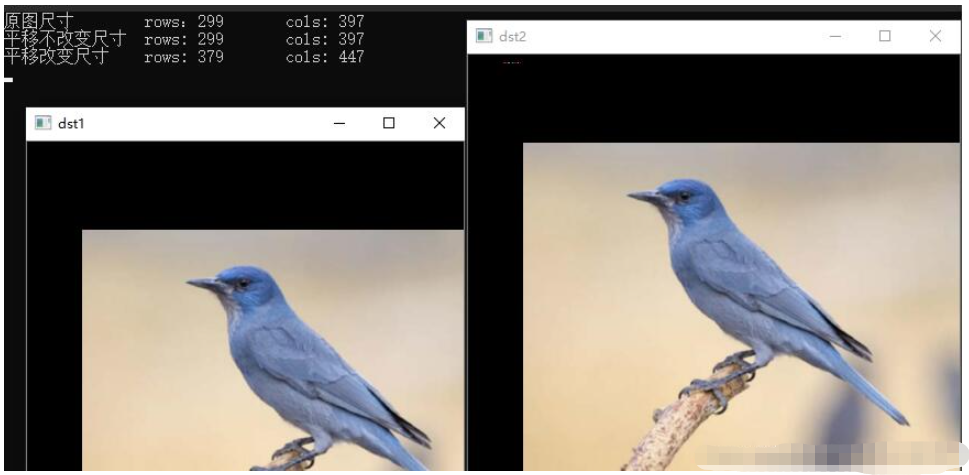本篇内容介绍了“怎么使用opencv实现图像平移”的有关知识,在实际案例的操作过程中,不少人都会遇到这样的困境,接下来就让小编带领大家学习一下如何处理这些情况吧!希望大家仔细阅读,能够学有所成!
图像平移指的是沿水平方向或垂直方向进行图像的移动。
平移变换公式:

对于原始图像而言,正变换矩阵:

对于目标图像而言,逆变换矩阵:

代码:
#include<opencv2/imgproc.hpp>
#include<opencv2/highgui.hpp>
#include<opencv2/core.hpp>
#include<iostream>
#include<stdlib.h>
using namespace std;
using namespace cv;
Mat imgTranslation1(Mat& src, int xOffset, int yOffset);
Mat imgTranslation2(Mat& src, int xOffset, int yOffset);
int main()
{
Mat src = imread("C:\\Users\\H\\Desktop\\niao.bmp");
if (src.empty())
{
cout << "请检查图像是否存在..." << endl;
return -1;
}
pyrDown(src, src);
cout << "原图尺寸\trows:" << src.rows << "\tcols: " << src.cols << endl;
int xOffset = 50, yOffset = 80;
Mat dst1 = imgTranslation1(src, xOffset, yOffset);
imshow("dst1", dst1);
cout << "平移不改变尺寸\trows: " << dst1.rows << "\tcols: " << dst1.cols << endl;
Mat dst2 = imgTranslation2(src, xOffset, yOffset);
imshow("dst2", dst2);
cout << "平移改变尺寸\trows: " << dst2.rows << "\tcols: " << dst2.cols << endl;
waitKey(0);
system("pause");
return 0;
}
图像的平移 ,大小不变
Mat imgTranslation1(Mat& src, int xOffset, int yOffset)
{
int nrows = src.rows;
int ncols = src.cols;
Mat dst(src.size(), src.type());
for (int i = 0; i < nrows; i++)
{
for (int j = 0; j < ncols; j++)
{
映射变换
int x = j - xOffset;
int y = i - yOffset;
边界判断
if (x >= 0 && y >= 0 && x < ncols && y < nrows)
{
dst.at<Vec3b>(i, j) = src.ptr<Vec3b>(y)[x];
}
}
}
return dst;
}
//图像平移大小改变
Mat imgTranslation2(Mat& src, int xOffset, int yOffset)
{
int nrows = src.rows + abs(yOffset);
int ncols = src.cols + abs(xOffset);
Mat dst(nrows, ncols, src.type());
for (int i = 0; i < nrows; i++)
{
for (int j = 0; j < ncols; j++)
{
int x = j - xOffset;
int y = i - yOffset;
if (x >= 0 && y >= 0 && x < ncols && y < nrows)
{
dst.at<Vec3b>(i, j) = src.ptr<Vec3b>(y)[x];
}
}
}
return dst;
}结果展示:

“怎么使用opencv实现图像平移”的内容就介绍到这里了,感谢大家的阅读。如果想了解更多行业相关的知识可以关注亿速云网站,小编将为大家输出更多高质量的实用文章!
免责声明:本站发布的内容(图片、视频和文字)以原创、转载和分享为主,文章观点不代表本网站立场,如果涉及侵权请联系站长邮箱:is@yisu.com进行举报,并提供相关证据,一经查实,将立刻删除涉嫌侵权内容。